Postpartum psychosis left mum fearing she was dead
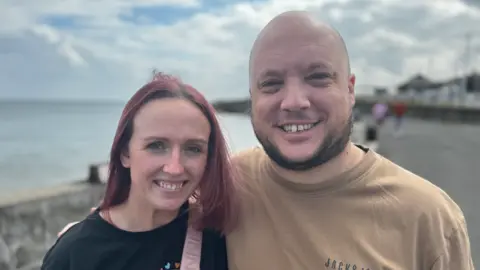 BBC
BBCA mother who thought she was dead and stuck "in limbo" while suffering from a rare mental illness says there is a shortage of beds for others in the same situation.
Kayleigh Avery, from Sunderland, also lost her ability to move, talk and function due to postpartum psychosis, days after her daughter Daisy was born.
She said she was "lucky" to get a place at the only specialist mother and baby unit (MBU) in the North East and Cumbria.
The Department of Health said it was committed to "fixing the broken system" to ensure it gave mental health the same "attention and focus as physical health". The NHS said it was investing £1.5m to expand maternal and perinatal mental health services.
Postpartum psychosis is a rare but serious mental health illness that can affect any new mother, according to the NHS.
Symptoms can include hallucinations, delusions, manic and low moods, loss of inhibitions, restlessness, out-of-character behaviour and confusion.
"It was scary," Mrs Avery, who lives in Thorney Close, said.
She recalls feelings of anxiety and an intense paranoia that health workers were going to take her baby away, before hallucinations and "hearing things that weren't there" took over.
Five days after Daisy was born it got worse, she said.
"My family said there’s something not right here, this is not just baby blues, it's something a bit more."
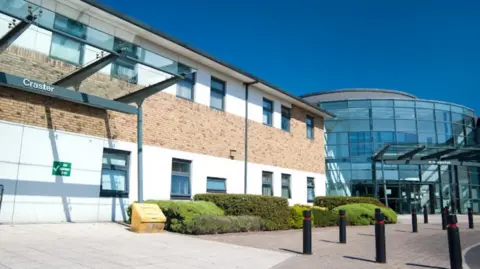 Google
GoogleMrs Avery said she had lost all sight of reality and thought she was dead. She would not engage with her family, thinking they were all actors.
She was sectioned and admitted to the MBU at the Beadnell Ward in St George's Park in Morpeth, Northumberland, which has six beds.
Dr Mennatullah Dakroury is a speciality doctor at Cumbria, Northumberland, Tyne and Wear NHS Trust, which runs the ward.
She said MBUs were vital as postpartum psychosis "massively impacts the ability of the mum" to care for herself and her child.
It caused an inability to "differentiate real world thoughts" from imagination, and in some cases could lead to self-harm, she said.
She said MBUs let mothers stay with their babies and build a bond, which could be lost if they are not treated together.
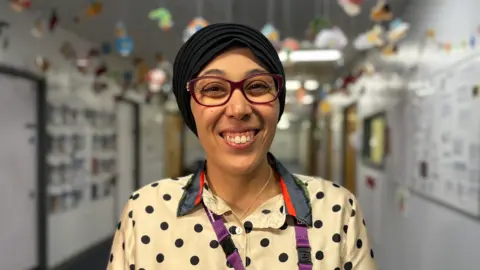
But as there is only one such unit in the North East, Mrs Avery faced being sent to the only other site with beds at the time, some 150 miles (241km) away in Derby.
"I was lucky," she said. "If I hadn't got that bed [in Morpeth], I could have been sent anywhere in the country."
She spent the next six weeks in treatment, which included shock therapy.
Four years later, Mrs Avery was sectioned again, this time eight months after the birth of her second child, Jasmine. She again took about six weeks to recover.
Her husband David Avery said getting to the Morpeth facility some 28 miles (45km) from Wearside was difficult, having to rely on public transport and lifts from friends.
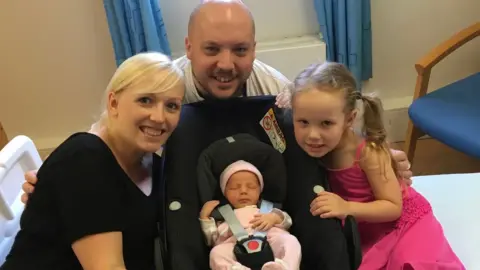 Handout
HandoutA mother from London was also receiving treatment there because of a bed shortage in the south, he added.
"There needs to be one [MBU] locally for every woman," he said.
"We were there every day, Kayleigh always had someone to see her. If it had been further down the country, I might not have been able to get there."
Mrs Avery agreed: "There needs to be more funding for MBUs and one in every area."
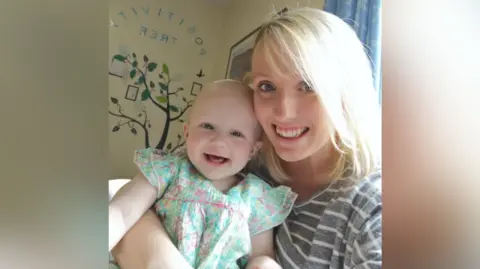 Handout
HandoutNational charity Action on Postpartum Psychosis (APP) is campaigning for more MBUs to be opened across the country, but particularly in north-east England and Scotland.
The charity said more than 1,400 people experienced the condition each year in the UK.
Sally Wilson, national training co-ordinator, said due to the shortage of such units, "people might be admitted to general psychiatric units, which are just not the place to be after you've had a baby".
Responding to concerns over the lack of support for women going through postpartum psychosis, the Department of Health said "people with mental health issues are not getting the support or care they deserve".
It said it would "fix the broken system to ensure we give mental health the same attention and focus as physical health".
It added it was "unacceptable that too many women are not receiving the maternity care that they deserve" and is "determined to make sure all women and their babies receive safe, personalised and compassionate care."
The NHS North East and North Cumbria Integrated Care Board said in a statement it was "investing an extra £1.5m to expand maternal and perinatal mental health services".
It was exploring "ways to improve mental health support", the statement added, and would review the way it provide these services over the coming months.
If you have been affected by any of the issues in this story, advice and support can be found via the BBC Action Line.
Follow BBC North East on X, Facebook, Nextdoor and Instagram. Send your story ideas to northeastandcumbria@bbc.co.uk
